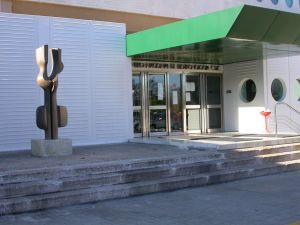
XXXI Workshop ADVANCES IN MOLECULAR BIOLOGY BY YOUNG RESEARCHERS ABROAD
Presentación de los avances anuales de los proyectos de investigación Fundación Jesús Serra en el CNB-CSIC
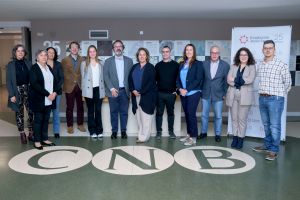
- Fundación Jesús Serra de GCO (Grupo Catalana Occidente) financia varios proyectos científicos en el Centro Nacional de Biotecnología (CNB-CSIC)
- Un año después del comienzo de los proyectos, los grupos seleccionados cuentan los avances de su investigación en una jornada celebrada en el CNB-CSIC.
La primera convocatoria de ayudas a la investigación Fundación Jesús Serra para jóvenes investigadores en el CNB-CSIC cumple un año, y los grupos seleccionados se han reunido en Madrid junto a representantes de Fundación Jesús Serra para presentar los avances en sus proyectos. En la reunión han estado presentes los componentes del comité evaluador de las ayudas: Laura Halpern Serra, vicepresidenta de Fundación Jesús Serra, y los investigadores del CNB Inés M. Antón, Lluís Montoliu (vicedirector) y Mario Mellado, director del centro, así como Susana Codina, subdirectora de Fundación Jesús Serra y Ana Cuenda, vicedirectora del CNB.
A lo largo de la jornada, los grupos han detallado los avances realizados gracias al apoyo de la Fundación, que les han permitido desde realizar la puesta a punto de modelos celulares o la modernización de equipos necesarios en su investigación hasta publicar en revistas de prestigio internacional.
CNB participates in DeCYPher, a new european project that combines AI to obtain natural compounds
La regulación de la forma celular abre nuevas vías terapéuticas frente a Salmonella
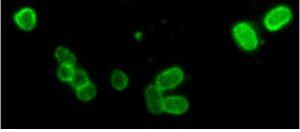
- Un nuevo mecanismo de regulación de la morfogénesis celular podría servir como diana efectiva para el tratamiento de las infecciones persistentes intracelulares causadas por Salmonella
Investigadores del Consejo Superior de Investigaciones Científicas (CSIC) en el Centro Nacional de Biotecnología (CNB-CSIC) han identificado un nuevo mecanismo molecular implicado en morfogénesis bacteriana que podría servir como diana efectiva para el tratamiento de las infecciones persistentes intracelulares por Salmonella. Los resultados de este trabajo se publican en la revista Communications Biology.
Pablo Laborda recibe el Premio Margarita Salas Ciencias de la Vida a las mejores tesis doctorales realizadas en la Comunidad de Madrid
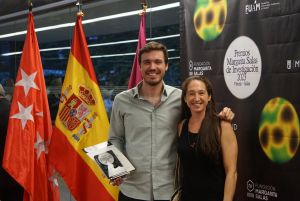
- El investigador Pablo Laborda ha recibido uno de los Premios Margarita Salas de Investigación por su tesis doctoral, el reconocimiento del Ayuntamiento de Madrid a las mejores tesis doctorales defendidas en la comunidad de Madrid. Su trabajo ha recibido el segundo premio en la categoría Ciencias de la Vida.
Laborda realizó su tesis doctoral “Understanding evolution to tackle antibiotic resistance in Pseudomonas aeruginosa” en el CNB-CSIC bajo la supervisión de los investigadores Sara Hernando y José Luis Martínez. Además de recibir la máxima calificación (Sobresaliente Cum laude y mención internacional) por su tesis, los resultados de su tesis han dado lugar a la publicación de 17 artículos en revistas internacionales revisadas por pares, incluyendo 7 primeras autorías, y artículos en revistas de alto impacto como PNAS, Molecular Biology and Evolution, Nature Communications o Nature Reviews in Microbiology.
A legacy from Ms. María Lourdes Díaz de la Guardia will fund a cancer research project at the CNB-CSIC.
De plegar a proteger: identificados los cambios estructurales de la chaperona DNAJA2 que le permiten cambiar su función celular
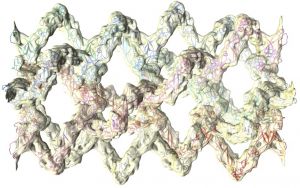
Investigadores del Centro Nacional de Biotecnología del Consejo Superior de Investigaciones Científicas (CNB-CSIC) y la Universidad del País Vasco han colaborado en el descubrimiento del mecanismo de funcionamiento de la chaperona DNAJA2, perteneciente a la familia de las llamadas Hsp40 o proteínas J, el más diverso dentro de las chaperonas. El trabajo, publicado en Nature Communications, desvela cómo las diferentes condiciones celulares afectan a su función.
Las chaperonas moleculares son un variado grupo de proteínas involucradas en la síntesis, plegamiento, prevención de la formación de agregados y degradación de las proteínas celulares. Debido a ese papel tan crítico en el control de la calidad de las proteínas, los errores en su funcionamiento están asociados a procesos cancerígenos y a distintas enfermedades degenerativas. Muchas de estas chaperonas pueden funcionar como moléculas individuales (monómeros), o en conjunto, desde dímeros a estructuras oligoméricas, y algunas varían su estado dependiendo de las circunstancias. Este trabajo muestra que la chaperona DNAJA2, de la familia Hsp40 (hasta ahora conocidas como auxiliares de las chaperonas Hsp70, pero cuyo papel se está mostrando cada día más importante), es una de las que puede actuar tanto como monómero como oligómero.
Luis Enjuanes receives the Gregorio Marañon National Research Award
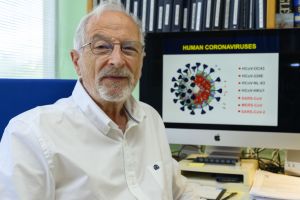
The National Research Awards 2023, granted by the Ministry of Science and Innovation, recognise the professional career of CNB researcher Luis Enjuanes. The jury has awarded him the 'Gregorio Marañón' National Research Award, in the area of Medicine and Health Sciences, for the excellence and impact of his work, making him a reference in the field of virology. His excellent career is complemented by the impact of his contributions to the knowledge of coronavirus replication and transcription, as well as his continuous research and innovation in the area of vaccines.
The National Research Awards, worth 30,000 euros in each category, distinguish Spanish researchers who stand out for their careers and international relevance in their respective areas of research. They also recognise the merit of young people - with a maximum age of 40 - who have made significant achievements in the early stages of their careers.
In addition to the CNB researcher, the awards have recognised the work of seven other researchers from the Spanish National Research Council (CSIC) in the fields of archaeology, virology, mathematics and global change, as well as molecular biology, nanogenerators and dance.
First Cryo-EM structures of homomeric GluA1 AMPA glutamate receptor reveals functional roles for N-terminal domains
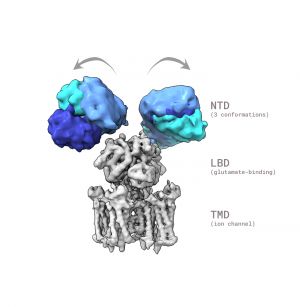
Previously unseen structural flexibility of N-terminal domains is crucial for regulating speed by which GluA1 opens and closes ion channel gate, and recruiting receptor into synapse
AMPA receptors (AMPARs) are glutamate-gated cation channels, composed of four core subunits – GluA1 to GluA4 – and are the primary mediators of excitatory neurotransmission throughout the brain, playing a central role in learning and memory at synapses. There are two primary types of receptors: GluA2-containing, Ca2+- impermeable, and GluA2-lacking, Ca2+-permeable (CP). All structural studies have focused on the former, which dominate in the brain. There is currently no structural knowledge concerning GluA2-lacking receptors, despite their prominent expression in glia and interneurons, and their involvement in long-term potentiation and a range of neuropathologies. Ingo Greger’s group, in the LMB’s Neurobiology Division, has now published the first structures of a GluA2-lacking AMPAR, the GluA1 AMPA receptor homomer, a prominent CP AMPAR.
A new mathematical model explains the relationship between cognitive complexity and brain asymmetry
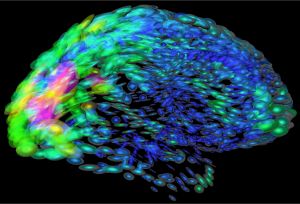
- The framework, developed by a scientist at the Spanish National Research Council (CSIC), allows us to carry out calculations concerning neural circuits and the presence of symmetries, and to test empirical hypotheses
- The new theory proves mathematically an open conjecture dating back to the beginnings of neuroscience.
Most animals have mirror-symmetric bodies: left and right are equal, but flipped side-wise. This property is inherited by the brain. However, some cognitive functions break this symmetry and appear lateralized. For example, language usually engages only the left side. The biological mechanisms for breaking this symmetry are not known in detail. A new mathematical framework developed by Luis F Seoane, researcher at the Spanish National Research Council (CSIC), proves how the emergence of higher cognitive complexity entails an evolutionary pressure that favors brain lateralization. The scientific paper verifying this popular hypothesis is published by the journal Physical Review X.
COOKIES POLICY
A cookie is a text file that is stored on your computer or mobile device via a web server and only that server will be able to retrieve or read the contents of the cookie and allow the Web site remember browser preferences and navigate efficiently. Cookies make the interaction between the user and the website faster and easier.
General information
This Website uses cookies. Cookies are small text files generated by the web pages you visit, which contain the session data that can be useful later in the website. In this way this Web remembers information about your visit, which can facilitate your next visit and make the website more useful.
How do cookies?
Cookies can only store text, usually always anonymous and encrypted. No personal information is ever stored in a cookie, or can be associated with identified or identifiable person.
The data allow this website to keep your information between the pages, and also to discuss how to interact with the website. Cookies are safe because they can only store information that is put there by the browser, which is information the user entered in the browser or included in the page request. You can not run the code and can not be used to access your computer. If a website encrypts cookie data, only the website can read the information.
What types of cookies used?
The cookies used by this website can be distinguished by the following criteria:
1. Types of cookies as the entity that manages:
Depending on who the entity operating the computer or domain where cookies are sent and treat the data obtained, we can distinguish:
- Own cookies: are those that are sent to the user's terminal equipment from a computer or domain managed by the editor itself and from which provides the service requested by the user.
- Third party cookies: these are those that are sent to the user's terminal equipment from a machine or domain that is not managed by the publisher, but by another entity data is obtained through cookies.
In the event that the cookies are installed from a computer or domain managed by the editor itself but the information collected by these is managed by a third party can not be considered as party cookies.
2. Types of cookies as the length of time that remain active:
Depending on the length of time that remain active in the terminal equipment can be distinguished:
- Session cookies: cookies are a type designed to collect and store data while the user accesses a web page. Are usually used to store information that only worth preserving for the service requested by the user at any one time (eg a list of products purchased).
- Persistent cookies: cookies are a type of data which are stored in the terminal and can be accessed and treated for a period defined by the head of the cookie, and can range from a few minutes to several years.
3. Cookies types according to their purpose:
Depending on the purpose for which the data are processed through cookies, we can distinguish between:
- Technical cookies: these are those that allow the user to navigate through a web page or application platform and the use of different options or services it exist as, for example, control traffic and data communication, identify the session, access to restricted access parts, remember the elements of an order, make the buying process an order, make an application for registration or participation in an event, use security features while browsing store content for dissemination videos or sound or share content via social networks.
- Customization cookies: these are those that allow the user to access the service with some general characteristics based on a predefined set of criteria in the user terminal would eg language, the type of browser through which you access the service, the locale from which you access the service, etc.
- Analysis cookies: they are those that allow the responsible for them, monitoring and analyzing the behavior of users of the web sites that are linked. The information gathered through such cookies are used in measuring the activity of web sites, application or platform and for the profiling of user navigation of such sites, applications and platforms, in order to make improvements function data analysis how users use the service.
Management tool cookies
This Website uses Google Analytics.
Google Analytics is a free tool from Google that primarily allows website owners know how users interact with your website. Also, enable cookies in the domain of the site in which you are and uses a set of cookies called "__utma" and "__utmz" to collect information anonymously and reporting of website trends without identifying individual users..
For statistics of use of this website use cookies in order to know the level of recurrence of our visitors and more interesting content. This way we can concentrate our efforts on improving the most visited areas and make the user more easily find what they are looking for. On this site you can use the information from your visit for statistical evaluations and calculations anonymous data and to ensure the continuity of service or to make improvements to their websites. For more details, see the link below privacy policy [http://www.google.com/intl/en/policies/privacy/]
How to manage cookies on your computer: disabling and deleting cookies
All Internet browsers allow you to limit the behavior of a cookie or disable cookies within settings or browser settings. The steps for doing so are different for each browser, you can find instructions in the help menu of your browser.
If you decline the use of cookies, since it is possible thanks to the preferences menu of your browser or settings, reject, this website will continue to function properly without the use of the same.
Can you allow, block or delete cookies installed on your computer by setting your browser options installed on your computer:
- For more information about Internet Explorer click here.
- For more information on Chrome click here.
- For more information about Safari click here.
- For more information about Firefox click here.
Through your browser, you can also view the cookies that are on your computer, and delete them as you see fit. Cookies are text files, you can open and read the contents. The data within them is almost always encrypted with a numeric key corresponding to an Internet session so often has no meaning beyond the website who wrote it.
Informed consent
The use of this website on the other hand, implies that you paid your specific consent to the use of cookies, on the terms and conditions provided in this Cookies Policy, without prejudice to the measures of deactivation and removal of cookies that you can take, and mentioned in the previous section.


